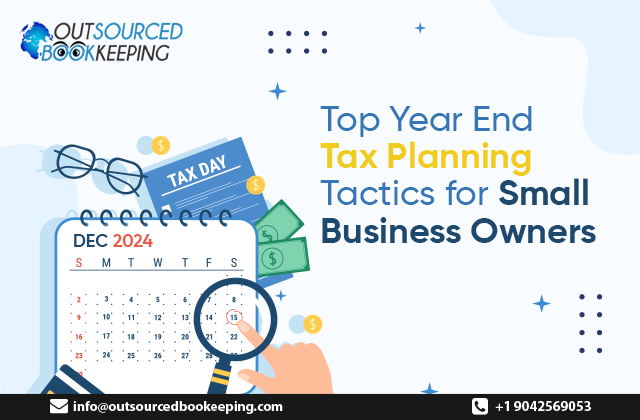Year-end tax planning tactics provide small business owners with an opportunity to minimize taxes and build a stronger financial future.
In this blog, we will discuss how businesses can use tax incentives and how outsourced accounting for SMEs can assist with this. In the last quarter, SMEs should consider the following strategies.

1. Analyze Financial Documents and File
Effective tax management relies heavily on maintaining accurate financial records. Furthermore, outsourcing bookkeeping for tax purposes guarantees that all business transactions are properly categorized for tax filing. Additionally, it ensures compliance and simplifies the process of identifying potential deductions and credits. Ultimately, regular reviews allow you to assess your business’s financial position and determine necessary actions before the year-end.
2. Maximize Tax Deductions
Tax deductions for U.S. small businesses can reduce the taxable income. Small business owners should also account for expenses like office supplies, furniture, equipment, employee welfare, and transportation. If you want to fully maximize these deductions, you have to keep good records. In this regard, outsourced accounting for SMEs makes it easier by categorizing and listing all allowable expenses so that none of the opportunities for tax optimization are left out.
3. Invest in Your Business
Acquisition of new equipment, new software, or employee training are tax deductions for small businesses. Section 179 of the IRS allows you to deduct some business expenses that you can deduct from your taxable income. By consulting your bookkeeping or accounting department before the investment is made, they can be in harmony with your tax planning.
Tax Preparation Tips for SMEs
1. Maximizing Retirement Contributions
Contributing to a SEP IRA or 401(k) retirement plan is not only good for long-term financial planning but also comes with tax benefits in the short term. These are tax-exempt and can help you reduce your taxable income by a big amount. Small business owners can track contribution limits and deadlines when working with experts who offer outsourced bookkeeping for tax purposes.
2. Income Should Be Accelerated Or Expenses Should Be Deferred
If your business has performed well and anticipates increased income, you may want to consider deferring some revenues to the next year. Similarly, increasing expenses, such as paying bills or purchasing stocks ahead of time, can help reduce taxable income. Moreover, outsourced accounting for SMEs equips you with the essential information needed to make informed decisions at the right time.
3. Claim Depreciation Benefits
If your business has purchased fixed assets like vehicles, machinery, or technology, the year-end tax planning is the best time to revisit depreciation allowances. SME tax preparation is about determining what assets to depreciate and how to calculate it. These deductions may help you save a lot of taxes and thus more money to be used for other needs.
Outsourced Bookkeeping is Critical for Tax Relief
Outsourced bookkeeping for tax savings is not just an efficient solution. It is a competitive edge. When you hire professional bookkeepers, they not only ensure your books are up to date and accurate but also make them ready for tax preparation. They can help find deductions, ensure the company is within its rights with the IRS, and help plan for the end of the year.
Outsourced accounting services for SMEs also provide flexibility, expansion, and access to the most advanced tools and equipment. By outsourcing your financial operations, you can focus on running your business while outsourcing specialists take care of your taxes.
Lowering Taxes with Bookkeeping
-
Track Every Expense
The large deductions are always the small expenses. This means that every admissible expense is captured and entered under the right account.
-
Keep the owner’s and the business’s finances completely separate
Keeping a clear line between personal and business accounts is essential. By doing so, you ensure that your accounts remain separate, which helps avoid any confusion. Additionally, this distinction guarantees that all expenses incurred in the business qualify for deductions.
-
Review Tax Credits
Other than the deductions, there are tax credits such as the Work Opportunity Tax Credit (WOTC) or research and development credits that a small business may qualify for. A professional bookkeeping team can find and claim these benefits.
It’s time to get ready now for a trouble-free tax season. Preventive tax planning prevents small businesses from last-minute rush and fines. Following these strategies at the end of the year can save you money on taxes now and in the future.
Conclusion
Tax preparation for SMEs does not have to be complicated. Small business owners can rest assured that they know how to meet year-end tax requirements and minimize costs by planning and working with outsourced bookkeeping services.
Outsourced Bookkeeping is a company that provides professional services to improve small business finances and tax planning. Learn how to reduce taxes with bookkeeping by contacting us and we can help you meet your financial goals!








